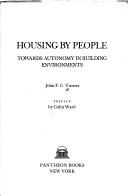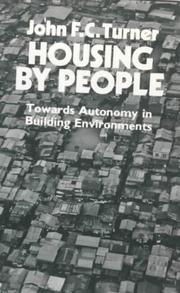| Listing 1 - 10 of 16 | << page >> |
Sort by
|
Book
ISBN: 9029396075 Year: 1978 Publisher: Baarn
Abstract | Keywords | Export | Availability | Bookmark
 Loading...
Loading...Choose an application
- Reference Manager
- EndNote
- RefWorks (Direct export to RefWorks)
Sociology of environment --- human ecology --- Social policy --- Private houses --- Architecture --- Social geography --- 351.778.5 --- 711 --- Stedenbouw ; denken over --- Architectuur en maatschappij ; huisvesting --- 711.4(A) --- Stedenbouw. Ruimtelijke ordening ; denken over de stedenbouw --- Wonen --- Algemeen --- Algemeen. --- 320 --- wonen --- wooncultuur --- sociale vraagstukken --- questions sociales
Book
Year: 1976 Publisher: London Boyars
Abstract | Keywords | Export | Availability | Bookmark
 Loading...
Loading...Choose an application
- Reference Manager
- EndNote
- RefWorks (Direct export to RefWorks)

ISBN: 0394409027 Year: 1977 Publisher: New York
Abstract | Keywords | Export | Availability | Bookmark
 Loading...
Loading...Choose an application
- Reference Manager
- EndNote
- RefWorks (Direct export to RefWorks)
Book
Year: 1972
Abstract | Keywords | Export | Availability | Bookmark
 Loading...
Loading...Choose an application
- Reference Manager
- EndNote
- RefWorks (Direct export to RefWorks)

ISBN: 0394732588 Year: 1977 Publisher: New York, NY : Pantheon Books,
Abstract | Keywords | Export | Availability | Bookmark
 Loading...
Loading...Choose an application
- Reference Manager
- EndNote
- RefWorks (Direct export to RefWorks)
LOGEMENT --- ETATS-UNIS --- HISTOIRE --- CONDITIONS SOCIALES --- 20E SIECLE

ISBN: 0714525693 0714525685 9780714525693 Year: 1976 Publisher: London: Boyars,
Abstract | Keywords | Export | Availability | Bookmark
 Loading...
Loading...Choose an application
- Reference Manager
- EndNote
- RefWorks (Direct export to RefWorks)
John Turner's classic essay makes a unique contribution to housing theory and practise. His Three Laws of Housing summarize the psychological, social and economic basis of his thesis: 1: When people have no control over, nor responsibility for, key decisions in the housing process, dwelling environments may become a barrier to personal fulfilment and a burden on the economy. 2. The important thing about housing is not what it is but what it does in people's lives. 3. Deficiencies and imperfections in your housing are infinitely more tolerable if they are your responsibility than if they are somebody else's.
Architecture --- Politique foncière --- Economie d'energie --- Habitat --- Logement --- Philosophie --- Politique fonciere --- Housing --- Affordable housing --- Homes --- Houses --- Housing needs --- Residences --- Slum clearance --- Urban housing --- City planning --- Dwellings --- Human settlements --- Social aspects --- 351.778.5 --- 351.778.5 Ruimtelijke ordening. Volkshuisvesting. Plannen van aanleg. Woningbouw.--Woonhygiene, zie {613.5}; z.o. {?711.6-164} --- Ruimtelijke ordening. Volkshuisvesting. Plannen van aanleg. Woningbouw.--Woonhygiene, zie {613.5}; z.o. {?711.6-164} --- Housing. --- Housing policy --- Economic aspects.
Book
Year: 1972 Publisher: Washington: Department of housing and urban development,
Abstract | Keywords | Export | Availability | Bookmark
 Loading...
Loading...Choose an application
- Reference Manager
- EndNote
- RefWorks (Direct export to RefWorks)
Book
Abstract | Keywords | Export | Availability | Bookmark
 Loading...
Loading...Choose an application
- Reference Manager
- EndNote
- RefWorks (Direct export to RefWorks)
From their worldwide experience the authors show that where dwellers are in control, their homes are better and cheaper than those built through government programs or large corporations
Book
Abstract | Keywords | Export | Availability | Bookmark
 Loading...
Loading...Choose an application
- Reference Manager
- EndNote
- RefWorks (Direct export to RefWorks)
As Robert Fichter writes in the Preface: "This is a book concerned with the activity called housing. From a variety of perspectives, the authors examine the participation or lack of participation of dwellers themselves in that activity. Their conclusions... are that as dwellers lose control over their living environments, shelter becomes a commodity of decreasing value to the individual and often an inordinate expense to society. "The authors, experienced in various fields and in many countries of the world, expose the wastefulness of institutionalized housing and show, by contrast, how self-fulfilling and productive the housing process can be when the user is in control.The answer to the universal dissatisfaction with mass housing (and to the literal bankruptcy of many public housing projects in the U.S.) is provided by individuals, community groups, and other grassroots organizations which have brought back dwellers' traditional freedom to sponsor, build, or simply to manage their own homes. Housing is a paradigm of all human activities. Some approaches to housing are models of how those activities can be perverted. But when the user is in control, those activities can begin to achieve their natural expression. William Grindley shows how 160,000 U.S. families, of all income levels, annually build their own homes, saving 1/3 the construction costs of equivalent commercially built homes. Richard Spohn details legislation to support and extend the network of locally available services which take owner-building possible. Rolf Goetze analyzes a successful experiment in self-help rehabilitation of deteriorated inner-city houses. Hans Harms tells how a group of low-income tenants have organized to purchase and renovate the apartment building which urban renewal threatened to drive them out of.Donald Terner, in a new analysis of industrialized building, contrasts the high costs and inflexibility of mobile-type "module" units with the real economies which can be achieved through mass production of compatible components, easily assembled or disassembled by users or local builders. Peter Grenell and John Turner relate their experiences in India and Peru, where each discovered bureaucratic and professional blindness and also discovered awakening to basic issues of user control which has emerged as much from the desperation of the Third World as from the disillusionment of the rich, industrialized world. The authors presented some of the material in this book at the December 1970 session of the American Association for the Advancement of Science, and later refined their conclusions during a series of seminars held at Ivan Illich's Institute in Cuernavaca, Mexico. The result, a closely interrelated set of essays, contains a message for all those concerned with human freedom in our bureaucratized, technological society.
Book
Abstract | Keywords | Export | Availability | Bookmark
 Loading...
Loading...Choose an application
- Reference Manager
- EndNote
- RefWorks (Direct export to RefWorks)
| Listing 1 - 10 of 16 | << page >> |
Sort by
|

 Search
Search Feedback
Feedback About UniCat
About UniCat  Help
Help News
News